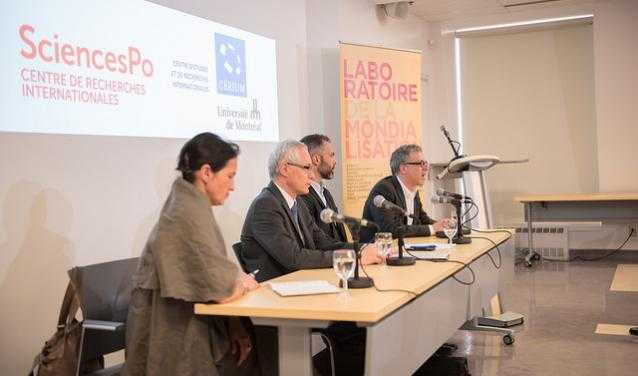Home>Sciences Po and Université de Montréal launch a Chair

21.06.2016
Sciences Po and Université de Montréal launch a Chair
On 16 June 2016 in Montréal, Sciences Po CERI and CERIUM launched a Chair in International Studies. The research centres' respective directors, Alain Dieckhoff and Frédéric Mérand, explain their ambitions for this Chair.
Why did CERI and CERIUM establish a Chair in International Studies? What are its objectives?
Alain Dieckhoff: CERI and CERIUM have strong historical ties. Both were established to improve scientific knowledge in the field of international studies. The purpose of this partnership is to enable us to share and disseminate a common vision of research in the social sciences. CERI (Center for International Studies) is the largest of Sciences Po’s research units and concentrates on both international/transnational relations and regional studies. Fieldwork, empirical and comparative methods are essential characteristics of CERI’s approach to international and area studies. CERI and CERIUM can be considered twins in that respect. Through the establishment of this Chair in International Studies, we would like to strengthen our collaboration by stimulating joint research projects, training doctoral candidates and disseminating knowledge on international issues through seminars, conferences and symposiums.
Frédéric Mérand: Alain is right about our common history. Created in 2004 and now hosting more than 60 senior fellows in anthropology, economics, sociology, history, political science, religious studies and philosophy, CERIUM was consciously modelled on CERI. Over the years, we’ve organised joint summer schools with CERI fellows such as Jean-Philippe Béja, Luis Martinez and Christophe Jaffrelot. We’ve hosted post-doctoral fellows who either came from CERI or were recruited there, such as Sandrine Perrot.
Alain is also right about our shared vision. In today’s academic international studies community, CERI and CERIUM stand out as the two largest French-language research hubs. Both are heavily invested in doctoral training and outreach activities, both of which aim to foster an ever larger community of internationally-minded academics, professionals and citizens. We also share a commitment to cutting-edge theory informed by empirical fieldwork. Our scholars are open to the world, they’ve boarded the train of academic globalisation, but they are also aware of their roots in their respective community.
What are the Chair's main research topics to be?
A.D.: We are interested by all international topics that help us understand the troubled world we live in. Take just one example: the attacks in Paris, Brussels and Orlando are challenging the academic community. We have a duty to seek a deep understanding of the eruption of Islamist violence at the heart of our democratic and open societies. This needs new and innovative thinking, not the convenient restating of old patterns. We also have to take a more resolutely interdisciplinary approach. The Chair aims to foster this kind of research and the courses it can nurture.
F.M.: What’s unique about the Chair is its structure. Every three years, a competition will be held and the Chair will be awarded to a tandem of scholars, one from Sciences Po and the other from Université de Montréal, who have presented the best project in terms of scientific value and institutional impact. Through summer schools, long-distance seminars and teamwork, the tandem will lead a joint research and training project that will result in publications, joint PhD supervision and hopefully grant applications. This is our way of spearheading the Francophone contribution to international studies.
The Research Chair in International Studies was launched with a conference entitled "Entre chaos et éclatement : le monde en 2016". What were the highlights and key points to take away from this conference?
F.M.: For the launch, we wanted to give a taste of the great things that happen when we put our researchers in the same room. So we invited Valérie Amiraux, a sociologist from UdeM who got her doctorate from Sciences Po, Lee Seymour, a political scientist from UdeM who was trained at Sciences Po and Northwestern University, and Alain Dieckhoff to share their views on regional conflicts. As the moderator, I learned, thanks to Alain and Lee, that while violence has decreased in Africa over the past decade, it has increased in the Middle East. Alain and Lee identified three key factors for the shift: the evolution of the international system, state strength, and the relative success of international and regional organisations. That said, Valérie also reminded us of the risks involved in lumping very different phenomena into the same category, and urged us, as scholars, to bring a critical perspective to the public sphere.
A.D.: Frédéric summarised quite well how the launch conference worked. Let me just stress one thing that emerged strongly: states do not guarantee the absence of violence (think of the numerous wars among states). However, conflicts today are more and more internal or transnational and clearly linked with the collapse or absence of states (Libya, Irak, Yemen…). Thus it is urgent to rebuild legitimate states if we want to have a more peaceful world order. The conference was a good start and I am sure our cooperation will be very fruitful.
Related links
- Learn more about the CERI
- Learn more about the CERIUM
- The Université de Montréal is part of Sciences Po’s network of 470 partner universities
Photo (from left to right) : Valérie Amiraux (Chercheuse CERIUM, Professeure au Département de sociologie UdM), Alain Dieckhoff (Directeur du CERI Sciences Po), Lee Seymour (Chercheur CERIUM, Professeur agrégé au Département de Science politique UdM), Frédéric Mérand (Directeur du CERIUM, Professeur agrégé au Département de Science politique UdM)